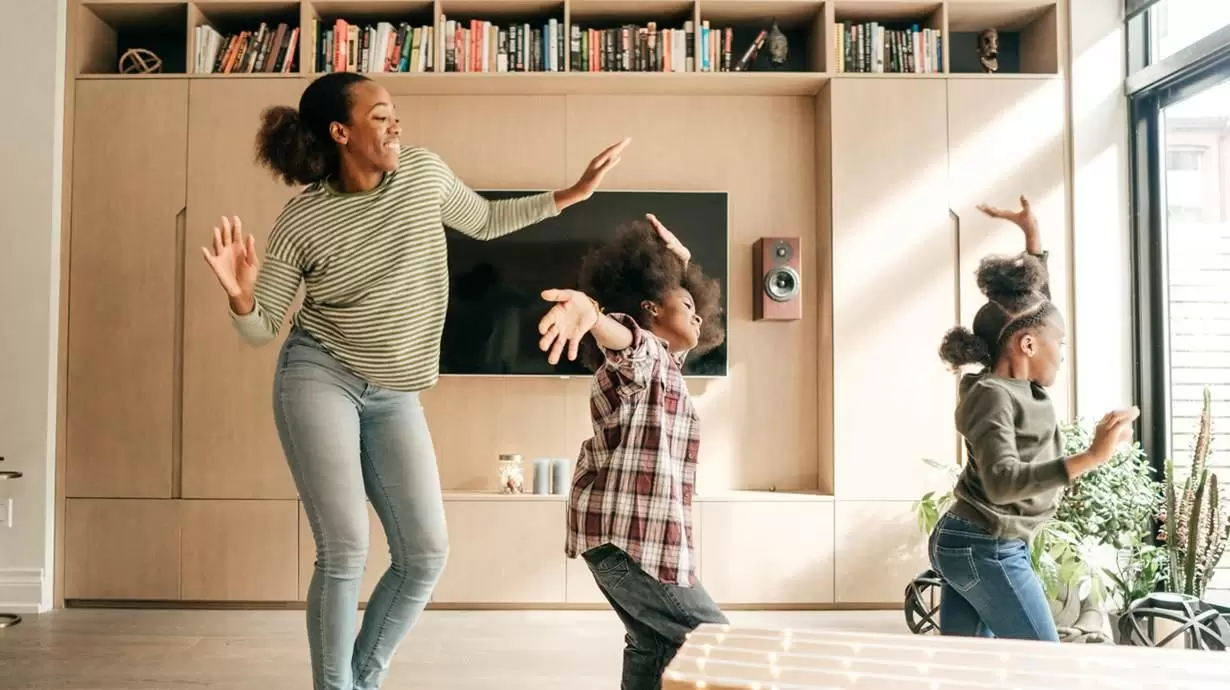- Press ToolsNews ReleasesMedia ContactsB-roll and imagesVerizon Fact SheetRSS FeedsEmergency ResourcesCable Facts
Screen-time routines: How music can help your child self-regulate
Mix up the screen-time routine with one of these research-based musical activities to turn those stressful moments into joyful connections.

When kids start to fuss, it can be easy to look to a screen to offer a quick distraction. But your device can offer another, often-overlooked, tool for soothing: music. Incorporating music into children’s calming routines can be a great addition to your screentime routines. Over time, it may even make it easier for kids to handle those moments when it’s time to power down.
Studies show that shared musical play—like clapping or dancing to a tune—can help children self-soothe, increases trust in caregivers and eases anxiety. Here’s how and why it works.
Why musical play balances screen time
Musical interaction can release the feel-good hormone dopamine, as well as other feel-good chemicals including:
- Endorphins. These can help reduce feelings of anxiety or discomfort, making it easier for kids to relax and feel calm.
- Serotonin. Balanced serotonin levels help maintain a steady mood, reduce anxiety and improve sleep quality, which is essential for growth and emotional resilience.
- Oxytocin. Known as the “love hormone,” this helps children feel secure and feel trust in the world around them. This hormone is key to young children’s ability to trust when a parent says things like, “It’s time to turn off the TV and go to bed,” along with other social behaviors, such as communication and empathy.
This is about more than hormones, too. In a study by the University of Queensland, researchers found that children who played music with others at ages 2 – 3 showed increased empathy and increased listening and sharing abilities at ages 4 – 5. Adding a few musical activities into your daily routine can nurture these qualities in your child, too.

Two screen-free musical activities to soothe and redirect your child
These exercises work best for kids from ages 3 – 7.
Make waiting easier: Waiting is tough for little ones. Sitting in the pediatrician’s office or in any other waiting room can sometimes be too much to ask.
How to try it: Play a song like “Clap, Clap, Clap Your Hands” in the Kindermusik music app, which has simple, repetitive movements. Get down on your child’s level, make eye contact and clap along with the music. Once they’ve mastered clapping, invite them to add their own moves or suggest some yourself.
Why it works: Engaging in a musical activity provides focused attention and connection. When people sing and move together, their brain waves sync up, creating a feeling of unity and calm.
Make transitions smoother: Whether it’s time to come inside after play, or time to clean up, or end screen time, transitions can be overwhelming for kids.
How to try it: Play an upbeat tune like “A Happy Party” from the Kindermusik app and dance with your child to the beat. Match their movements and acknowledge them (“I see you wiggling your hips!”). Experiment with homemade instruments, like car keys or wooden spoons, and challenge your child to find different ways to play along.
Why it works: Music can ease tricky transitions by giving an immediate dopamine boost through pure joy. And when you synchronize movements, children get that extra oxytocin boost to trust you when you ask them to move on to the next task.
Make music part of your routine, too
Don’t expect instant results—this isn’t an only-need-to-do-it-once solution. But using music alongside screen time can create a healthier balance and help your child develop self-regulation skills. Plus, musical play will likely calm you, too, making daily transitions smoother for everyone.
Get peace of mind about your child’s digital life. Try Verizon Family.
Deanna Bucci, mother and director of Product Development for Kindermusik International, is a music and child development educator specializing in screen-free activities that support self-regulation and family bonding. The free Kindermusik app is full of music for kids to encourage musical play between parents and their children.
The author has been compensated by Verizon for this article.
